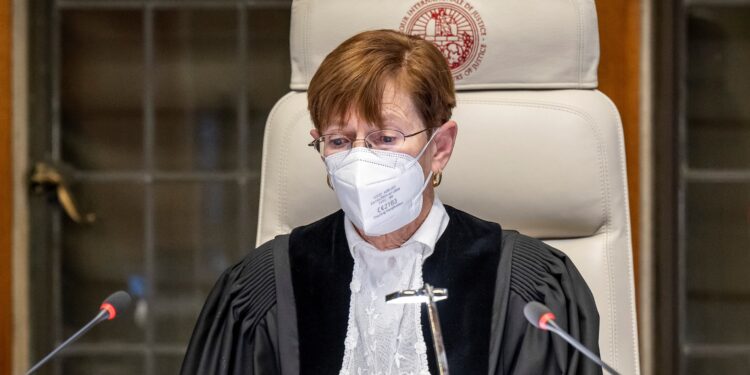The International Court of Justice has ordered Russia to immediately suspend its military operations in Ukraine.
The court order was read out in the Peace Palace in The Hague by International Court of Justice (ICJ) President Joan Donoghue on Wednesday, March 16, 2022.
The case concerning allegations of genocide under the Convention on the Prevention and Punishment of the Crime of Genocide (Ukraine v. Russian Federation), brought by Ukraine, was a rather atypical use of the Genocide Convention. That international treaty was drafted and adopted in the 1940s, after World War II and its horrors: the Holocaust, or the Shoah in Hebrew, with concentration camps like Auschwitz and mass executions of Jews in Ukraine by the German troops under the command of dictator Adolf Hitler.
The convention aims at preventing genocide and punishing the perpetrators, if it still occurs. As for other international treaties, states can bring disputes about its violation or interpretation before the ICJ.
Such cases are typically brought against an alleged perpetrator by a “victim state”, like when Bosnia sued Yugoslavia in 1993. In 2019 there was a first: The Gambia sued a country in another continent, Myanmar, for the alleged genocide against an ethnic and religious group, the Rohingyas.
Russia alleges that Russian nationals and Russian-speaking people were victims of genocide in eastern Ukraine. So, according to the familiar pattern, one might have expected Russia to sue Ukraine before the ICJ.
Instead, it was the other way round: Russia used the alleged genocide as a pretext for the military intervention, and then Ukraine went to the ICJ. It submitted in its application that the alleged genocide does not give Russia the right to intervene militarily. If Moscow believes there is a genocide, it should address the matter at UN organs, such as the ICJ, the United Nations Security Council (UNSC), or the United Nations General Assembly (UNGA), Kiev submits. Ukraine says that Russia abused the prevention provision in the Genocide Convention.
The ICJ found that it has no evidence of genocide in Ukraine before it and that to prevent genocide, states may only act within the limits of international law. The ICJ also found that the indication of provisional matters is urgent because of the loss of life in Ukraine and the grave concern that the UNGA expressed about the humanitarian situation: numerous civilian deaths; destruction; and lack of food, water, and electricity.
The court order to Russia to suspend its military operations in Ukraine is a moral victory for Ukraine, though it was not unanimous: the Russian and Chinese judges voted against it. Unfortunately for the Ukrainians, the court order is not enforceable in case of non-observance. The ICJ, the principal judicial organ of the UN, has no police force of its own. In case of violation of the court order, the only recourse for Ukraine is to go to the UNSC, where Russia, with its veto, can prevent any coercive action against itself.
On February 26, 2022, two days after the Russian invasion started, Ukraine filed in the Registry of the court an application instituting proceeding against the Russian Federation concerning a dispute relating to the interpretation, application, and fulfilment of the 1948 Convention on the Prevention and Punishment of the Crime of Genocide.
The public hearing started and concluded on March 7, 2022, at the Peace Palace after Ukraine presented its single round of oral arguments. The Russian Federation did not attend the hearing. On that day, Ukraine sought an emergency order from the ICJ to halt hostilities on its territory.
After Wednesday’s urgent court order, a procedure on the merits of the case will follow. Such procedures at the ICJ usually take years.







